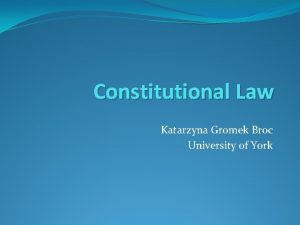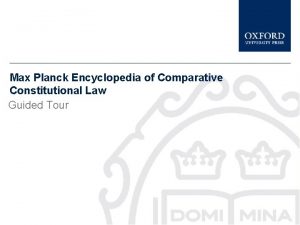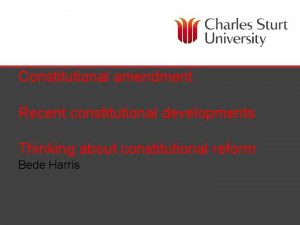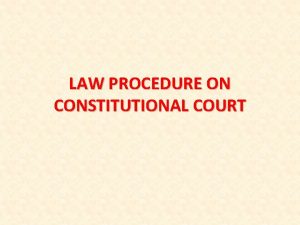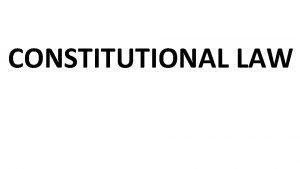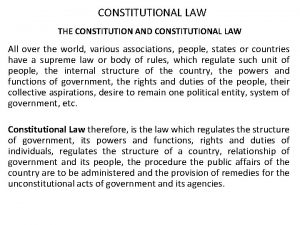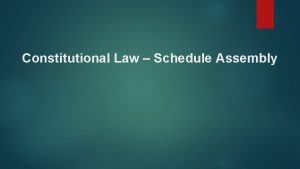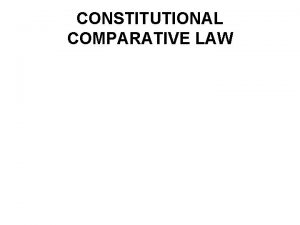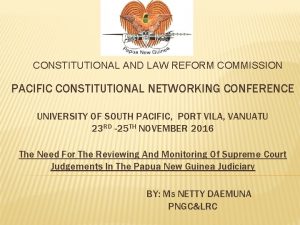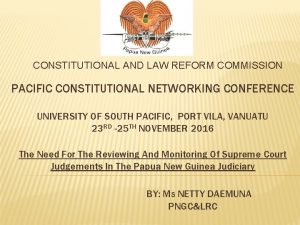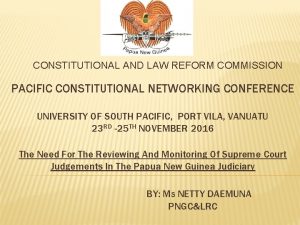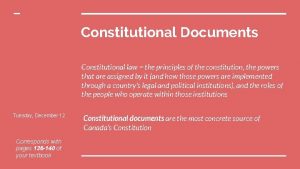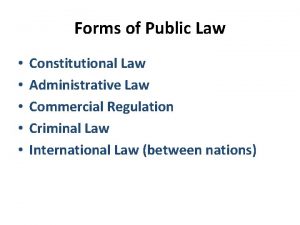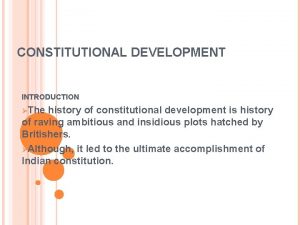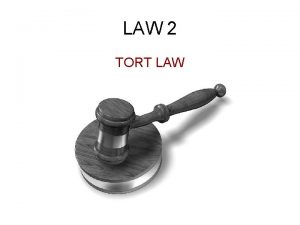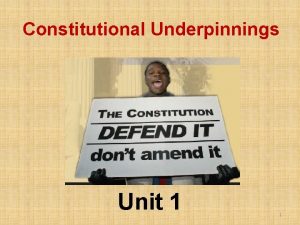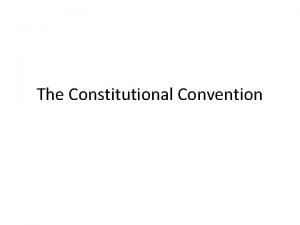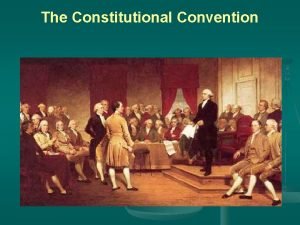Constitutional Law Introduction to Constitutional Law The U












































- Slides: 44

Constitutional Law

Introduction to Constitutional Law The U. S. Constitution is the framework that established the three branches of government. It is also the supreme law of the land, which all public officials to enforce. The Constitution guarantees each American certain basic rights. It is the oldest written national constitution in the world that is still in use. It is also remarkable because it adapts itself to changing conditions. To understand constitutional law, there are some basic ideas to keep in mind

Basic Constitutional Law Principles First, the rights guaranteed in the Constitution are not absolute. The unrestricted exercise of certain rights would restrict the rights of others. Ex: Freedom of speech does not mean that anyone can endanger others. Freedom of the press does not allow a person to intentionally lie. Freedom of religion does not protect every religious practice.

Basic Constitutional Law Principles The courts have designed several “Constitutional Tests” to help decide when conflicts arise over the meaning of the Constitution. Ex. The balancing test: balancing the rights of one person against the rights of a group. Falsely shouting “fire” in a crowded theater


Basic Constitutional Law Principles The second basic idea in understanding constitutional law is: that the Constitution protects citizens from certain actions by the government. Strictly speaking, if a neighbor comes into your house and seizes your television, it does not violate the Constitution. It may, however, constitute a tort, a crime, or both. Certain private actions, though not unconstitutional, have been made unlawful by congressional or state legislative action.

Basic Constitutional Law Principles The U. S. Constitution provides a so called constitutional floor, or a minimum level of rights. This means that no government—federal, state, or local—can establish a lower level of legal rights than the level found in the U. S. Constitution. However, governments can be more protective of rights than what the Constitution requires. Ex. Murder, theft, and robbery


Constitutional Amendments The basis to constitutional protections are found in constitutional amendments: changes or additions to the original document. The original Constitution, adopted in 1787, contained only a few provisions guaranteeing individual rights. However, citizens pressured their leaders to add a Bill of Rights. In response, the amendments were adopted by Congress in 1791 and quickly ratified by the states.

The Constitutional Amendment Process

Constitutional Amendments The Bill of Rights contain many of our basic rights: The First Amendment is the freedom of religion, assembly, petition, press, and speech. The Second Amendment is the right to bear arms. The Third Amendment is the right against quartering soldiers in private homes. The Fourth Amendment protects against unreasonable searches and seizures.

Constitutional Amendments The Fifth Amendment provides a right to due process of law—fair procedures that are required when government action affects your rights—and gives certain rights to accused people, including protection against self incrimination, double jeopardy, and fair compensation in cases of eminent domain. The Sixth Amendment provides the rights to a lawyer, an impartial jury, a speedy and public trial in criminal cases.

Constitutional Amendments The Seventh Amendment is the right to a jury trial in civil cases. The Eight Amednment prohibits cruel and unusual punishments and excessive bail. The Ninth Amendment declares that the rights in the Constitution are not the only rights that people have. The Tenth Amendment states that the powers not delegated to the federal government are reserved for state governments.

The Bill of Rights

Constitutional Amendments In addition to the Bill of Rights, later amendments provide other important rights. The Thirteenth Amendment forbids slavery and outlaws involuntary servitude, except as punishment for a crime. The Fourteenth Amendment requires equal protection of the laws for all citizens. It also provides that no state can deprive any citizen of “life, liberty, or property without due process of law. ” The Fifteenth Amendment forbids denying the right to vote based on race or color.

Constitutional Amendments The Nineteenth Amendment gives women the right to vote. The Twenty third Amendment gives citizens of Washington, D. C. , the right to vote in presidential elections. The Twenty fourth Amendment prohibits poll taxes. The Twenty sixth Amendment gives all people 18 years of age or older the right to vote. All of these additions to the Constitution have provided important protections and reflect a significant historical situation.

Constitutional Amendments

Freedom of Speech

The First Amendment

Introduction to Freedom of Speech The freedom of speech clause of the First Amendment guarantees the right to express information and ideas in all media. The First Amendment exists to protect ideas that may be unpopular or different from those of the majority. The U. S. Constitution protects not only the person making the communication, but also the person receiving it. Therefore, the First Amendment includes the right to hear, to see, to read, and in general to be exposed to different messages and points of view.

Introduction to Freedom of Speech Expression may be symbolic as well as verbal. Symbolic speech is conduct that expresses an idea. Although speech is commonly thought of as verbal expression, we are all aware of nonverbal communication. Si tins, flag waving, demonstrations, and wearing armbands or protest buttons are examples of symbolic speech. Tinker v. Des Moines – silent protests in schools using armbands Texas v. Johnson – flag burning

The Importance of Freedom of Speech The First Amendment’s protection of speech and expression is central to U. S. democracy, enabling people to obtain information from a diversity of sources, make decisions, and communicate these decisions to the government. The First Amendment provides us with a “marketplace of ideas. ” Rather than having the government establish the truth, freedom of speech enables the truth to emerge from diverse opinions. A free, unfettered exchange of ideas and information gives society a “safety valve” that helps the people deal with change in a more orderly, stable way. Conservative speakers on college campuses https: //youtu. be/Hwr 5 Tv. Gr. Mi. U

Forms of Unprotected Speech Obscenity Defamation Fighting Words

Obscenity is anything that treats sex or nudity in an offensive or lewd manner, violates recognized standards of decency, and lacks serious literary, artistic, political, or scientific value. Some communities have tried to ban all pornographic works that degrade or depict sexual violence against women Other communities regulate adult bookstores and movie theaters by restricting them to special zones (zoning laws) Most communities have passed laws outlawing child pornography and greatly restricting minors’ access to sexually oriented material.

Obscenity

Defamation is a false expression about a person that damages that person’s reputation. When defamation is spoken, it is called slander. Defamation published in a more lasting form—for example, a writing, film, compact disc, or blog—is called libel. There is a concern that holding speakers, which include the press, legally responsible for comments about matters of public importance will “chill” or discourage expression.

Defamation

Fighting Words: The First Amendment does not protect the use words that are so abusive or threatening that they are likely to produce a fight between the speaker and the listener. Their value is outweighed by society’s interest in maintaining order. The government must also decide how to deal with speakers who advocate illegal activities. Schenck v. United States The “Clear and Present Danger Test” Dennis v. United States – harm proposed by speaker Brandenburg v. Ohio – The “Incitement Test” (immediate lawless action)

Hate Speech: bigoted speech attacking or dis paraging a social or ethnic group or a member of such a group. Those who support punishment for hate speech argue that strong measures should be taken because of the emotional and psychological impact hate speech has on its victims and its victims’ communities Opponents to punishment for hate speech claim that such speech codes put the government into the censorship business— favoring certain content or viewpoints and disfavoring others—in violation of the First Amendment

Fighting Words and Hate Speech The Skokie Case: https: //vimeo. com/232775518#embed

Freedom of Religion

Freedom of Religion The Ground Zero Mosque Controversy

Religion in the First Amendment Religious freedom is protected from government interference by two clauses in the First Amendment: the establishment clause and the free exercise clause. The establishment clause forbids the government establishing an official state religion. The free exercise clause protects the right of individuals to worship or believe as they choose.

The First Amendment

The Establishment Clause Text: “Congress shall make no law respecting an establishment of religion” Thomas Jefferson once referred to the establishment clause as a “wall of separation between church and state. ” However, churches are indirectly aided by government in many ways. For example, churches do not have to pay real estate taxes, even though they receive government services such as police and fire protection.

The Establishment Clause The Establishment clause in the First Amendment forbids state and federal governments from: Setting up churches Passing laws aiding one or all religions Favoring one religion over another Passing laws requiring attendance at any church or belief in any religious idea

The Establishment Clause “The Lemon Test, ” was created by the Supreme Court in the 1971 case, Lemon v. Kurtzman. It involves three requirements for a law or government action involving religion to be constitutional: The challenged law or government action must have a secular, or nonreligious, purpose. The primary effect of the law or action must be neither to advance nor to inhibit, or hold back, religion. The operation of the law or action must not foster excessive entanglement of government with religion. Controversy over the Lemon Test

Controversial Issues: The Establishment Clause Prayer in public schools Aid to parochial schools Creationism and evolution in public schools Displaying the Ten Commandments in government buildings Official government holidays

Creationism vs. Evolution in Public Schools Teaching Creationism in Schools

The Free Exercise Clause Text: “Congress shall make no law… prohibiting the free exercise thereof” [of religion] The free exercise clause in the First Amendment protects the right of individuals to worship as they choose. As a rule, religious belief is protected, yet actions based on those beliefs may be restricted if they violate an important secular government interest.

The Free Exercise Clause If the government intentionally acts to interfere with religious practice, the courts will almost always protect the religious practice. However, when an individual’s right to free exercise of religion conflicts with other important interests, the First Amendment claim does not always win. Ex. Mormons and Polygamy Native American Religions and Peyote (addressed by the RFRA)

The Free Exercise Clause In the 1990’s Congress decided to codify further protections for religious freedom: The Religious Freedom Restoration Act (RFRA) 1993 It is intended to prevent other federal laws from substantially burdening a person's free exercise of religion.

Controversial Issues: The Free Exercise Clause Animal sacrifice Medical treatments for minors Prayer in schools by students Mandatory schooling (Amish) Contraception and health insurance

Medical treatments for minors Faith Healing Over Medicine
 Scope of constitutional law
Scope of constitutional law Max planck encyclopedia of comparative constitutional law
Max planck encyclopedia of comparative constitutional law Hình ảnh bộ gõ cơ thể búng tay
Hình ảnh bộ gõ cơ thể búng tay Slidetodoc
Slidetodoc Bổ thể
Bổ thể Tỉ lệ cơ thể trẻ em
Tỉ lệ cơ thể trẻ em Voi kéo gỗ như thế nào
Voi kéo gỗ như thế nào Thang điểm glasgow
Thang điểm glasgow Hát lên người ơi alleluia
Hát lên người ơi alleluia Môn thể thao bắt đầu bằng từ chạy
Môn thể thao bắt đầu bằng từ chạy Thế nào là hệ số cao nhất
Thế nào là hệ số cao nhất Các châu lục và đại dương trên thế giới
Các châu lục và đại dương trên thế giới Công thức tính thế năng
Công thức tính thế năng Trời xanh đây là của chúng ta thể thơ
Trời xanh đây là của chúng ta thể thơ Mật thư tọa độ 5x5
Mật thư tọa độ 5x5 Làm thế nào để 102-1=99
Làm thế nào để 102-1=99 Phản ứng thế ankan
Phản ứng thế ankan Các châu lục và đại dương trên thế giới
Các châu lục và đại dương trên thế giới Thể thơ truyền thống
Thể thơ truyền thống Quá trình desamine hóa có thể tạo ra
Quá trình desamine hóa có thể tạo ra Một số thể thơ truyền thống
Một số thể thơ truyền thống Cái miệng xinh xinh thế chỉ nói điều hay thôi
Cái miệng xinh xinh thế chỉ nói điều hay thôi Vẽ hình chiếu vuông góc của vật thể sau
Vẽ hình chiếu vuông góc của vật thể sau Biện pháp chống mỏi cơ
Biện pháp chống mỏi cơ đặc điểm cơ thể của người tối cổ
đặc điểm cơ thể của người tối cổ Thứ tự các dấu thăng giáng ở hóa biểu
Thứ tự các dấu thăng giáng ở hóa biểu Vẽ hình chiếu đứng bằng cạnh của vật thể
Vẽ hình chiếu đứng bằng cạnh của vật thể Fecboak
Fecboak Thẻ vin
Thẻ vin đại từ thay thế
đại từ thay thế điện thế nghỉ
điện thế nghỉ Tư thế ngồi viết
Tư thế ngồi viết Diễn thế sinh thái là
Diễn thế sinh thái là Dot
Dot Số.nguyên tố
Số.nguyên tố Tư thế ngồi viết
Tư thế ngồi viết Lời thề hippocrates
Lời thề hippocrates Thiếu nhi thế giới liên hoan
Thiếu nhi thế giới liên hoan ưu thế lai là gì
ưu thế lai là gì Khi nào hổ con có thể sống độc lập
Khi nào hổ con có thể sống độc lập Khi nào hổ con có thể sống độc lập
Khi nào hổ con có thể sống độc lập Hệ hô hấp
Hệ hô hấp Từ ngữ thể hiện lòng nhân hậu
Từ ngữ thể hiện lòng nhân hậu Thế nào là mạng điện lắp đặt kiểu nổi
Thế nào là mạng điện lắp đặt kiểu nổi Newton's first law and second law and third law
Newton's first law and second law and third law
